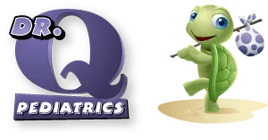Ear Infections and Your Child
- posted: Apr. 08, 2015
I have chosen to discuss the subject of ear infections in this month's blog because it is the most common affliction affecting pediatric patients, and one that as practioners, Dr. Q and I spend much time learning to diagnose. According to Stan Block, M.D., ear infections, acute otitis media (AOM) is the most common reason for prescribing antibiotics in pediatric practice. Before routine Prevnar vaccination, which prevents infection with one of the most common bacterial causes, AOM developed in 94% of all children in a non inner city population by the age of 24 months.
For all its frequency, diagnosing AOM is one of the most technically difficult tasks to perform on young children. It requires a confident, firm parent to restrain the child, as well as extreme diligence, patience, upper arm strength and a stable eye, for the doctor to perform the task in children under 2. Stan Block, MD goes onto further assess the stumbling blocks to accurate tympanic membrane assessment in his article "Improving the Diagnosis of Acute Otitis Media: Seeing Is Believing".
AOM is diagnosed when the ear drum can be visualized and is purulent and or bulging with pressure. If the ear cannot be seen with certainty and the child is in pain or has an elevated temperature, treatment should still be considered. For those children who may have mild ear findings and symptoms, observation may be warranted. If treatment with an antibiotic is sought, the American Acadamy of Pediatrics recommends Amoxicillin or Augmentin as first line therapy. If patients are Penicillin allergic, Cefdinir may be used. If a child fails initial treatment for AOM, a course of an antibiotic not yet used or injectable Rocephin for up to 3 days is recommended. If AOM still fails to respond, referral to an otolaryngologist may be recommended for tympanostomy tube insertion. AOM with fever and other signs of inflammation must be treated, for complications of AOM, although rare, can include mastoiditis, meningitis, temproal abscess, intracranial abscess and sinus thrombosis to name a few.
Children may also be referred to the otolaryngologist for recurrent AOM if they have had 3 ear infections in 6 months or 4 in a year, or have what is known as chronic otitis media with effusion (OME). OME after an episode of AOM is common and resolves within 3 months in most cases. It is important that this does resolve however, because persistence may lead to language delay and hearing loss.
Recurrent AOM and OME, althought most often associated with infections, can also be associated with allergic rhinitis. Mediators released after allergen exposure result in nasal allergic inflammation producing eustacian tube (the tube connecting nose to ear) edema and inflammation. Eustacian tube dysfunction is one of the most common causes of ottitis media, in addition to one of the most common causes of ear pain, not associated with true AOM. For children with allergic rhinitis associated AOM, treatment with daily antihistamines and topical steroids may be effective.
Finally, for those children who fail antibiotic therapy or treatment for allergic rhinitis and continue with AOM or OME and may or may not have hearing loss, tympanostomy tube insertion may be indicated. In this case, a small open cylinder is placed in the tympanic membrane to allow the membrane to remain open to the ambient environment. This small device equalizes the pressure on both sides of the tympanic membrane and allows space for material to drain should an infection occur. These tubes often dramatically reduce the number of ear infections and upper respiratory infection symptoms in children. In some cases, tonsillectomy and adenoidectomy may also be indicated for OM on a case by case basis.
Please, let us know if you have specific questions about your child and ear infections.
Contact Us
Doctor Q Pediatrics
448 S Alafaya Trl Suite 1 Orlando, FL 32828 Main line:(407) 275-5700
FAX: (407) 381-5802
Office Hours (12:30-2:00 -Closed daily)Staff is answering phone calls at 8:30am
| Monday: | 09:00 AM - 05:00 PM |
| Tuesday: | 10:00 AM - 05:30 PM |
| Wednesday: | 09:00 AM - 12:00 PM |
| Thursday | 09:00 AM - 05:30 PM |
| Friday: | 09:00 AM - 12:00 PM |
| Saturday: | Closed |
| Sunday: | Closed |
To make a payment to your account please click on this link:
